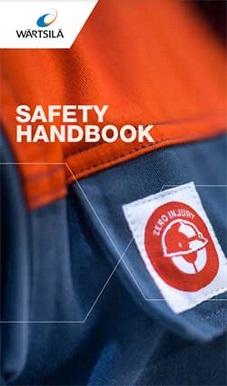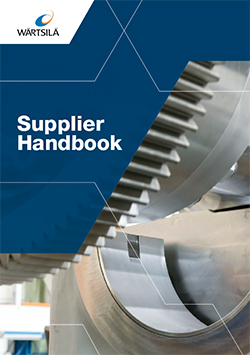

Supplier guidelines
Wärtsilä Supplier Handbook
The Wärtsilä Supplier Handbook provides a general overview of what Wärtsilä expects from its suppliers in terms of developing an understanding of the related interactions and interfaces.
- General information
- Quality assurance related information on supplier deliverable products and material
- Information on supplier performance processes
- Operational way of working with suppliers
This document is applicable both for existing Wärtsilä suppliers as well as for companies desiring to become suppliers. It is intended to provide guidance on building supplier operations that meet our company requirements.
Safety Handbook
The Safety Handbook offers assistance and guidance for performing work safely, at Wärtsilä project sites, in factories or workshops, or in the offices. This Handbook provides a quick guide and summary of the minimum, basic safety practices to be applied worldwide by Wärtsilä personnel, without overriding any local additional rules and regulations. Local regulation should always apply in addition to these corporate guidelines.

Cyber security brochure
The cyber security brochure shares some of the behaviours which Wärtsilä recognises as best practices. In the brochure you can find guidelines which support a common and shared responsibility in ensuring the cyber security of the ecosystem for both Wärtsilä and our partners.

Wärtsilä Life-saving rules
Ten life-saving rules are put in place to ensure consistent behavior to prevent incidents that could result in a serious injury or a fatality. The life-saving rules apply to all workers and partners involved with Wärtsilä’s operations or visiting our premises.

Supplier invoicing instructions
Wärtsilä prefers e-invoices, please find more information on the Digital Collaboration page. If an e-invoice is not applicable in your country, please follow the instructions mentioned on the purchase order. Wärtsilä does not retrieve purchase invoices from external sources, e.g. customer portals.
Supplier bank details confirmation
Wärtsilä requires its approved suppliers to give advance notice of future changes to banking information. If the change request is not submitted to Wärtsilä on time and to a correct contact, Wärtsilä cannot pay the invoices until the bank details are confirmed by supplier.
When new suppliers are onboarded, Wärtsilä intends to start collecting bank account information already during the general sourcing process and finalize it at the latest when signing the procurement contract, to make it possible to start transactions soonest after contracting. Wärtsilä will contact supplier with separate instructions for the detail’s collections.
Mandatory invoice content requirements
The required information is stated in the Purchase Order that Wärtsilä has issued to you. Please help us ensure smooth invoice processing by providing all needed content information in your invoice. Use the checklist below before sending your invoice to Wärtsilä.
- Wärtsilä Company name, address and VAT/tax registration number
- Business unit (in Wärtsilä Finland Oy)
- Wärtsilä’s contact person name / invoice approver
- Supplier’s company name, address and VAT/tax registration number
- Purchase order = PO number. The number is visible on the PO Wärtsilä has issued to you
- In case no PO, a cost object is required (cost center, order, network, WBS, shipment number)
- Supplier’s bank details (including IBAN/SWIFT)
- Delivery address of the goods/service
- Other mandatory information
- Date and number of the invoice
- Invoice due date according to the agreed payment terms
- Purchase order line numbers in the same order as in the PO
- Description of supplied goods/services
- Quantity and price (net and gross)
- Currency
- Delivery number
- In case of a freight purchase invoice, also consignee information must be mentioned
- Customs data related information
- Country of origin, commodity code and when applicable also ECN/ECCN for each item line
- Additional requirements regarding intra EU deliveries
- Net weight
NOTE! Purchase invoices must comply with Wärtsilä purchase invoice requirements. Failure to do so will result in delayed payments.
Additional invoice information
- English language should be used in all invoices.
- Wärtsilä prefers all invoices to be sent as single invoices with a purchase order number. This ensures increased automation in invoice processing.
- In addition to the mandatory information presented above some suppliers might be required to enclose additional information as stated in their agreement with Wärtsilä.
- Payment reminders or payment status requests should be sent in English to the Wärtsilä Accounts Payable team.
- Wärtsilä has an invoicing partner Candex in some countries for selected suppliers. If you need any support throughout Candex invoicing process, please feel free to reach out to support@candex.com. Please find more information on the Digital Collaboration page.
